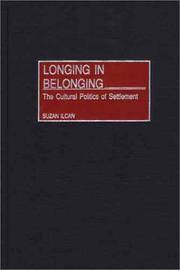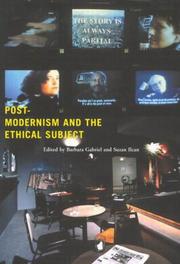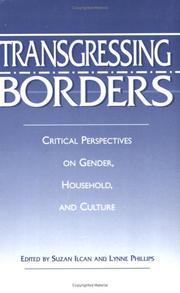| Listing 1 - 8 of 8 |
Sort by
|
Book
ISBN: 0773588825 9780773541290 0773541292 9780773541757 9780773588820 9780773588837 9780773588820 0773588833 Year: 2013 Publisher: Montréal & Kingston McGill-Queen's University Press
Abstract | Keywords | Export | Availability | Bookmark
 Loading...
Loading...Choose an application
- Reference Manager
- EndNote
- RefWorks (Direct export to RefWorks)
The mobility of people, objects, information, ideas, services, and capital has reached levels unprecedented in human history. Such forms of mobility are manifested in continued advances in communication and transportation capacities, in the growing use of digital and biometric technologies, in the movements of Indigenous, migrant, and women's groups, and in the expansion of global capitalism into remote parts of the world. Mobilities, Knowledge, and Social Justice demonstrates how knowledge is mobilized and how people shape, and are shaped by, matters of mobility. Richly detailed and illuminating essays reveal the ways in which issues of mobility are at the centre of debates, ranging from practices of belonging to war and border security measures, from gender, race, and class matters to governance and international trade, and from citizenship and immigration policies to human rights. Contributors analyze how particular forms of mobility generate specific types of knowledge and give rise to claims for social justice. This collection reconsiders mobility as a key term in the social sciences and humanities by delineating new ways of understanding how mobility informs and shapes lives as well as social, cultural, and political relations within, across, and beyond states. Contributors include Rob Aitken (Alberta), Tanya Basok (Windsor), Janine Brodie (Alberta), William Coleman (Waterloo), Ronjon Paul Datta (Alberta), Karl Froschauer (Simon Fraser), Daniel Gorman (Waterloo), Amanda Grzyb (Western), Suzan Ilcan (Waterloo), Eleonore Kofman (Middlesex), Anita Lacey (Auckland), Theresa McCarthy (Buffalo), Daniel J. Paré (Ottawa), Nicola Piper (Sydney), Parvati Raghuram (Open), Kim Rygiel (Wilfrid Laurier), Leslie Regan Shade (Toronto), Sandra Smeltzer (Western ), Daiva Stasiulis (Carleton), Myra Tawfik (Windsor), and Lloyd Wong (Calgary).
Social mobility. --- Social justice. --- Access to knowledge movement. --- A2K movement --- Knowledge access movement --- Social movements --- Equality --- Justice --- Mobility, Social --- Sociology

ISBN: 0313010560 9780313010569 0275967360 9780275967369 1280314982 9781280314988 9786610314980 9798400680595 Year: 2002 Publisher: Westport, Conn. Praeger
Abstract | Keywords | Export | Availability | Bookmark
 Loading...
Loading...Choose an application
- Reference Manager
- EndNote
- RefWorks (Direct export to RefWorks)
Acculturation. --- Group identity. --- Human settlements. --- Immigrants. --- Emigrants --- Foreign-born population --- Foreign population --- Foreigners --- Migrants --- Persons --- Aliens --- Habitat, Human --- Human habitat --- Settlements, Human --- Human ecology --- Human geography --- Population --- Sociology --- Land settlement --- Collective identity --- Community identity --- Cultural identity --- Social identity --- Identity (Psychology) --- Social psychology --- Collective memory --- Culture contact --- Development education --- Civilization --- Culture --- Ethnology --- Assimilation (Sociology) --- Cultural fusion --- Culture contact (Acculturation)

ISBN: 1283529971 9786613842428 0773571876 9780773571877 9781283529976 9780773527010 077352701X 0773527028 9780773527027 6613842427 Year: 2004 Publisher: Montreal, Que. McGill-Queen's University Press
Abstract | Keywords | Export | Availability | Bookmark
 Loading...
Loading...Choose an application
- Reference Manager
- EndNote
- RefWorks (Direct export to RefWorks)
Writing across the disciplines of sociology, literature, film, anthropology, and museology, the contributors examine the way in which radical postmodern shifts around knowledge and value have mobilized new relations between ourselves and others and transformed a range of cultural practices. This volume includes philosophical reflections and essays on museums and memory, visual culture, and relations with the other. Postmodernism and the Ethical Subject examines the altered frameworks that simultaneously help us to meet the contemporary challenge and raise the ethical stakes of our historical moment.
Ethics, Modern --- Postmodernism. --- Post-modernism --- Postmodernism (Philosophy) --- Arts, Modern --- Avant-garde (Aesthetics) --- Modernism (Art) --- Philosophy, Modern --- Post-postmodernism
Book
ISBN: 9780773538054 9780773537972 9780773586536 9780773586611 0773586539 077353797X 0773538054 077358661X Year: 2011 Publisher: Montreal ; Ithaca [N.Y.] : McGill-Queen's University Press,
Abstract | Keywords | Export | Availability | Bookmark
 Loading...
Loading...Choose an application
- Reference Manager
- EndNote
- RefWorks (Direct export to RefWorks)
"Every day we are barraged by statistics, images, and emotional messages that present poverty as a problem to be quantified, managed, and solved. Global generalizations present the poor as a heterogeneous group and stress globalized solutions. Governing the Poor exposes the ways in which such generalized descriptions and quantifications marginalize the poor and their experiences. Drawing on field research in Namibia and the Solomon Islands and case studies of international organizations such as USAID and Oxfam, Suzan Ilcan and Anita Lacey argue that aid programs have forged new understandings of poverty that are more about governing the poor through neo-liberal reforms than providing just solutions to poverty. The concepts of privation, empowerment, and partnership used in these programs are tools that treat the poor as a governed entity within a system of actors-governments, international organizations, and private businesses-that make up the global-aid regime. An illuminating work of critiques and solutions for the current global-aid regime, Governing the Poor shows the consequences of championing market-based solutions to poverty while neglecting to provide social infrastructure."--Book Jacket.
Social problems --- Social policy --- Development aid. Development cooperation --- Developing countries --- Poor --- Poverty --- Neoliberalism --- International agencies --- Non-governmental organizations --- Destitution --- Wealth --- Basic needs --- Begging --- Subsistence economy --- Associations, International --- IGOs (Intergovernmental organizations) --- Institutions, International --- Inter-governmental organizations --- Intergovernmental organizations --- International administration --- International associations --- International governmental organizations --- International institutions --- International organizations --- International unions --- Organizations, International --- Specialized agencies of the United Nations --- International cooperation --- Interorganizational relations --- Non-state actors (International relations) --- International organization --- Neo-liberalism --- Liberalism --- Government policy --- Neoliberalism. --- Government policy.
Multi
ISBN: 9780773538054 9780773537972 9780773586536 9780773586611 0773586539 077353797X 0773538054 Year: 2011 Publisher: Montreal, Que. McGill-Queen's University Press
Abstract | Keywords | Export | Availability | Bookmark
 Loading...
Loading...Choose an application
- Reference Manager
- EndNote
- RefWorks (Direct export to RefWorks)
Social problems --- Social policy --- Development aid. Development cooperation --- Developing countries

ISBN: 0897895185 Year: 1998 Publisher: London Bergin & Garvey
Abstract | Keywords | Export | Availability | Bookmark
 Loading...
Loading...Choose an application
- Reference Manager
- EndNote
- RefWorks (Direct export to RefWorks)
Families --- Households
Book
ISBN: 0228009189 0228009197 9780228009191 9780228009184 Year: 2021 Publisher: Montreal Kingston London Chicago
Abstract | Keywords | Export | Availability | Bookmark
 Loading...
Loading...Choose an application
- Reference Manager
- EndNote
- RefWorks (Direct export to RefWorks)
The Precarious Lives of Syrians reveals the vulnerability and insecurity that Syrian refugees confront in Turkey, including their socio-legal status, living conditions, and mobility. Drawing on legal and scholarly materials, as well as extensive field research, it provides a thoughtful and compelling appraisal of the experience of migration.
Syrians --- Refugees --- Social conditions. --- Economic conditions. --- Legal status, laws, etc. --- Government policy --- 2011 --- Syria --- History --- Refugees. --- EU Turkey Statement. --- Syrian refugees in Middle East. --- Syrian refugees in Turkey. --- Syrian refugees. --- displaced persons. --- displaced populations. --- human displacement. --- humanitarian aid refugees. --- humanitarian organizations. --- international migrants. --- refugee journeys. --- temporary protection.
Digital
ISBN: 9783031120855 9783031120848 9783031120862 9783031120879 Year: 2022 Publisher: Cham Springer International Publishing, Imprint: Palgrave Macmillan
Abstract | Keywords | Export | Availability | Bookmark
 Loading...
Loading...Choose an application
- Reference Manager
- EndNote
- RefWorks (Direct export to RefWorks)
This book is about homemaking in situations of migration and displacement. It explores how homes are made, remade, lost, revived, expanded and contracted through experiences of migration, to ask what it means to make a home away from home. We draw together a wide range of perspectives from across multiple disciplines and contexts, which explore how old homes, lost homes, and new homes connect and disconnect through processes of homemaking. The volume asks: how do spaces of resettlement or rehoming reflect both the continuation of old homes and distinct new experiences? Based on collaborations with migrants, refugees, practitioners and artists, this book centres the lived experiences, testimonies, and negotiations of those who are displaced. The volume generates appreciation of the tensions that emerge in contexts of migration and displacement, as well as of the ways in which racial categories and colonial legacies continue to shape fields of lived experience. Yasmine Shamma is Associate Professor of Modern and Contemporary English Literature, University of Reading, UK. Suzan Ilcan is Professor of Sociology at the Department of Sociology and Legal Studies, University of Waterloo and the Balsillie School of International Affairs, Canada. Vicki Squire is Professor of International Politics, Department of Politics and International Studies, University of Warwick, UK. Helen Underhill is a Researcher in the School of Architecture, Planning, and Landscape at Newcastle University, UK.
Philosophy and psychology of culture --- Sociology of culture --- Migration. Refugees --- Ethnology. Cultural anthropology --- Literature --- cultuur --- literatuur --- migratie (mensen) --- antropologie --- anno 1900-1999
| Listing 1 - 8 of 8 |
Sort by
|

 Search
Search Feedback
Feedback About UniCat
About UniCat  Help
Help News
News